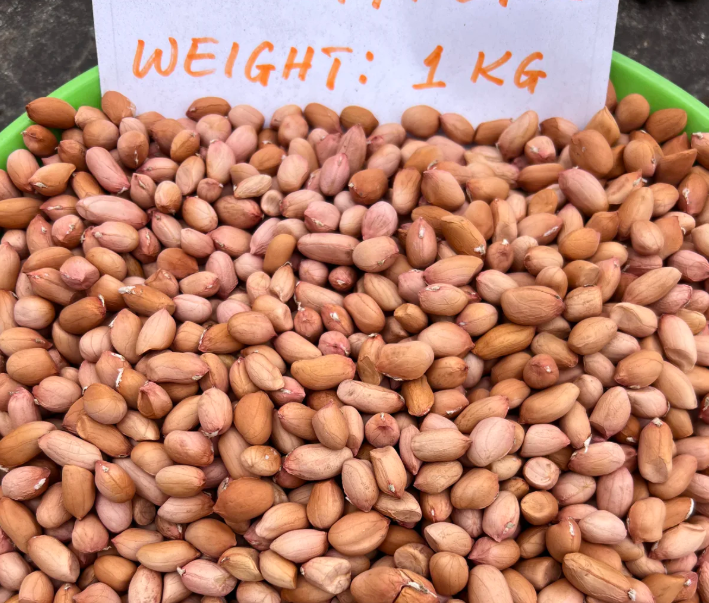Wednesday, 18 February 2026

In a significant advancement for Malawi’s agriculture, ICRISAT, collaborating with the Malawi Department of Agricultural Research Services (DARS) and supported by the EU-funded DeSIRA initiative, has introduced a new high-yielding groundnut variety for commercial farming
The new groundnut variety, ICGV-SMs 05650 (locally called CG18), is a Spanish-type cultivar developed specifically to address the needs of smallholder farmers and market demands in Malawi.
CG18 is designed to withstand local challenges such as climate stress, pests, and disease. It is notably resilient to drought, heat, and groundnut rosette disease—a major threat to yields in the region.
This variety offers high yields, enhancing both food security and farmers’ incomes.
ICRISAT Director General Dr. Himanshu Pathak praised the collaborative efforts of DARS, the DeSIRA initiative, and ICRISAT teams in bringing CG18 to market. He emphasized that CG18 embodies ICRISAT’s mission to provide science-based, resilient, and productive solutions that support climate adaptation and economic growth for smallholder farmers.
“We are proud to partner with Malawi to deliver innovations that tackle climate challenges while boosting opportunities for farming communities,” Dr. Pathak added.
Dr. Rebbie Harawa, Director of ICRISAT Africa and Global Research Program Director for Resilient Farm and Food Systems, described CG18 as a transformative innovation for smallholder farmers.
“It not only offers resilience against drought and disease but also opens doors to regional and export markets—turning climate challenges into economic opportunities for farming communities across Africa,” said Dr. Harawa.
The South Africa Groundnut Association (SAGA) has chosen CG18 for its export portfolio, highlighting the variety’s quality and competitiveness on the international stage. This selection paves the way for Malawian smallholders to access premium markets and achieve higher returns.
Dr. James Mwololo of ICRISAT, who co-led the variety’s development alongside Dr. Justus Chintu of DARS, emphasized the importance of CG18 for Malawi’s agriculture sector.
“CG18 represents the next wave of smart crop breeding—targeted, responsive, and inclusive of farmer and market needs. It combines cutting-edge science with real-world challenges. From climate resilience to disease resistance and market suitability, CG18 embodies our vision of agriculture that benefits people, profits, and the planet,” said Dr. Mwololo.
Regional Recognition and Expansion
The variety’s strong performance has attracted regional interest and has been proposed for release in Central Tanzania’s semi-arid zones, where low rainfall limits the success of conventional groundnut varieties. This highlights the increasing demand for climate-smart crops and reinforces Malawi’s leadership in groundnut breeding across Southern and Eastern Africa.
CG18’s release was approved by Malawi’s Agricultural Technology Clearing Committee (ATCC), which recognized its strategic importance in supporting the country’s agricultural priorities amid changing climatic conditions.
ICRISAT has been instrumental in advancing Malawi’s agriculture by developing and releasing improved groundnut varieties that have significantly increased productivity and resilience.
Since establishing operations in Malawi in 1982, ICRISAT has partnered closely with the Department of Agricultural Research Services (DARS) to introduce numerous groundnut varieties tailored to the country’s diverse agro-ecological conditions and market needs.
Key varieties include:
CG 7 (ICGV-SM 83708): Released in 1990, this Virginia-type variety is renowned for its high yields and drought tolerance.
Nsinjiro (ICGV-SM 90704): Introduced in 2000, it offers resistance to groundnut rosette disease and is widely cultivated in the region.
Kakoma (JL 24): A Spanish-type variety released in 2000, valued for its early maturity and adaptability.
Baka (ICG 12991): Released in 2001, it is a short-duration, drought-resistant variety also resistant to groundnut rosette disease.
Chitala (ICGV-SM 99568): Launched in 2005, combining high yield potential with disease resistance.
CG 8 to CG 14 (Various ICGV-SM lines): Released in 2014, this group of seven varieties offers traits such as early maturity, disease resistance, and suitability for varied agro-ecological zones.
CG 15 and CG 16: Developed through regional collaboration and released around 2020, these drought-tolerant Spanish types provide further options for farmers.
CG 18 (ICGV-SMs 05650): The latest variety, released in 2025, is a high-yielding, disease-resistant, and drought-tolerant Spanish type designed for both local consumption and export markets.
Overall, ICRISAT has played a key role in introducing at least 15 improved groundnut varieties in Malawi, boosting productivity, climate resilience, and livelihoods for smallholder farmers